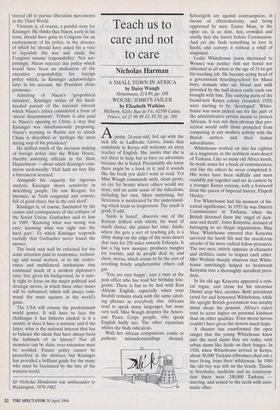Teach us to care and not to care
Nicholas Harman
Apushy 24-year-old, fed up with the rich life in Ladbroke Grove, trusts that somebody in Kenya will welcome an extra teacher of English. She insists that she is not there to help, but to have an adventure because she is bored. Presumably she knew there might be a book in it, and it sounds like the book you didn't want to read. Yet Miss Waugh commands swift, clean prose, an eye for beauty where others would see none, and an acute sense of the ridiculous, including her own. More surprising, her fierceness is moderated by the understand- ing which leads to forgiveness. The result is good, if odd.
Isiolo is bored', observes one of the Kenyan drifters with whom, for want of much choice, she passes her time. Isiolo, where she gets a sort of teaching job, is a filthy dump on the edge of the semi-desert that runs for 250 miles towards Ethiopia. It has a big new mosque, produces bangles for tourists, and its people deal in, and chew, meraa, which seems to be the sort of revolting bristly amphetamine others call gat.
'You are very happy', says a man at the post office who has read her birthday tele- grams. There is fun to be had with East African English, especially when your Swahili remains stuck with the same catch- ing phrases as everybody else. Africans tend to speak many languages, but none very well, Miss Waugh despises the Ameri- can Peace Corps people, who speak English badly too. The other expatriate whites she finds ridiculous.
With her African companions, comic or pathetic misunderstandings abound. Schoolgirls are against contraception, in favour of cliterodectomy, and being oppressed by men. Easter Mass, in the open air, is so slow, hot, crowded and smelly that she leaves before Communion. And yet she finds something to love in Isiolo, and conveys it without a whiff of soupiness.
Leslie Whitehouse (soon shortened to Wouse) was neither rich nor bored nor educated at all when at the age of 24 he got his teaching job. He became acting head of a government boarding-school for Masai boys, nomads who ate blood and milk provided by the half-dozen cattle each one brought with him. The outlying parts of the brand-new Kenya colony (founded 1920) were starting to be 'developed'. White- house was soon picked out for the part of the administrative service meant to protect Africans. It was not then obvious that pro- tection would unfit those protected from competing in any modern activity with the British settlers and their Indian subordinates.
Whitehouse worked on into his eighties as a magistrate in the northern semi-desert of Turkana. Like so many old Africa hands, he made notes for a book of reminiscences, and like the others he never completed it. His notes have been skilfully and most readably put together and set in context by a younger Kenya veteran, with a foreword from the queen of imperial history, Elspeth Huxley.
For Whitehouse had his moment of his- torical significance. In 1953 he was District Commissioner in Turkana, when the British detained there the 'angel of dark- ness and death', Jomo Kenyatta, accused of belonging to an illegal organisation, Mau Mau. Whitehouse ensured that Kenyatta survived the harsh life and the murderous attacks of his more radical fellow-prisoners. The two men, utterly opposite in character and abilities, came to respect each other. Mrs Watkins sharply observes that White- house unwittingly helped to brainwash Kenyatta into a thoroughly unradical presi- dent.
In his old age Kenyatta appeared a cyni- cal rogue, and chose for his successor Daniel arap Moi, another. Both presidents cared for and honoured Whitehouse, while the upright British government was notably mean about his pension. Africa's rulers tend to score higher on personal kindness than on other qualities. Even moral heroes couldn't have given the deserts much hope.
A disaster has transformed the open ranges that the young Whitehouse knew into the rural slums they are today, with urban slums like Isiolo on their fringes. In 1920, when Whitehouse arrived in Kenya, about 30,000 Turkana tribesmen eked out a bare living from their wilderness. In 1980 the old boy was still on the bench. Thanks to boreholes, medicine and no contracep- tion there were 240,000 Turkana — starving, and armed to the teeth with auto- matic rifles.


























































 Previous page
Previous page